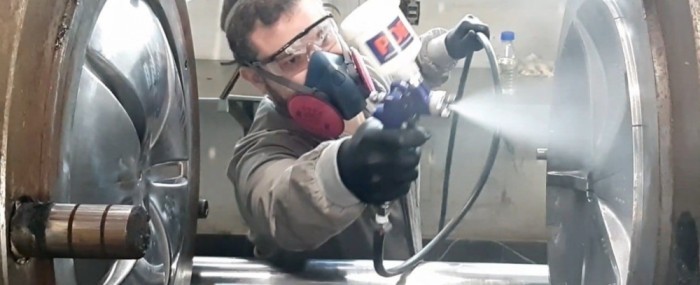
Ceramic coating increases hardness and abrasion resistance of injection-molded parts
26 de outubro de 2021FAPESP Innovative R&D – Researchers at nChemi, a startup located in São Carlos (state of São Paulo, Brazil), have developed an ultrathin ceramic coating for plastic injection molds.
The coating is only a few nanometers thick (a nanometer is a billionth of a meter). The technology, developed with funding from FAPESP’s Innovative Research in Small Business Program (PIPE), has a semi-permanent mold release effect on injectable parts, with competitive advantages over conventional demoldants in terms of cost, productivity, and sustainability.
The nanotechnological coating for industrial applications increases the surface hardness of metal by 90% and reduces friction by 50%. Technical analysis by Brazil’s National Service of Industrial Training (SENAI), an arm of the National Confederation of Industry (CNI), has confirmed this performance.
Because it is ultrathin, with a gauge of only 0.1 microns, the ceramic coating can be applied to molds of any size and with simple shapes or complex geometries including recesses and fine details.
The product withstands thousands of injection cycles until it has to be reapplied. For fiberglass-reinforced polyamide and polypropylene parts, it can reach 4,000 and 10,000 cycles respectively, according to Bruno Lima, a co-founder of nChemi.
In the case of polypropylene, its main advantage is avoiding adhesion, which typically occurs with large injected parts such as items for vehicle doors. In the case of fiberglass-reinforced polyamide, which is abrasive, its main advantage is longer tool working life.
Other benefits include productivity gains and optimization of production stages, with reports of a reduction in the interval between injection cycles for a component from 2.5 minutes to 30 seconds, according to Lima.
The technology contributes to sustainability by avoiding the use of conventional mold release agents and the loss of parts. It is also easy to apply, using a compressor to spray the coating onto the part, which is then dried and cured by a hot air blast.
The technology was initially designed for application to surgical instruments, with the aim of extending their useful life. Other industrial applications developed later include coating of milling machinery and drills, followed now by molds for the production of plastic parts.
“We specialize in developing and applying solutions based on nanotechnology for industrial applications, as well as providing high-quality functionalized nanoparticles for academic and private research,” says Lucas Leite, another co-founder of nChemi.
